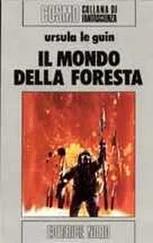“What’s the difference, Benton,” the old Colonel said at last, furious and shaky, “can’t you see that we can’t use the damned weapons? There’s three million of these aliens all scattered out all over every damned island, all covered with trees and undergrowth, no cities, no vital network, no centralized control. You can’t disable a guerrilla type structure with bombs, it’s been proved, in fact my own part of the world where I was born proved it for about thirty years fighting off major super-powers one after the other in the twentieth century. And we’re not in a position until a ship comes to prove our superiority. Let the big stuff go, if we can hold on to the sidearms for hunting and self-defense!”
He was their Old Man, and his opinion prevailed in the end, as it might have done in a Men’s Lodge. Benton sulked. Gosse started to talk about what would happen if the truce was broken, but Selver stopped him. “These are possibilities, we aren’t yet done with certainties. Your Great Ship is to return in three years, that is three and a half years of your count. Until that time you are free here. It will not be very hard for you. Nothing more will be taken away from Centralville, except some of Lyubov’s work that I wish to keep. You still have most of your tools of tree-cutting and ground-moving; if you need more tools, the iron-mines of Peldel are in your territory. I think all this is clear. What remains to be known is this: When that ship comes, what will they seek to do with you, and with us?”
“We don’t know,” Gosse said. Dongh amplified: “If you hadn’t destroyed the ansible communicator first thing off, we might be receiving some current information on these matters, and our reports would of course influence the decisions that may be made concerning a finalized decision on the status of this planet, which we might then expect to begin to implement before the ship returns from Prestno. But due to wanton destruction due to your ignorance of your own interests, we haven’t even got a radio left that will transmit over a few hundred miles.”
“What is the ansible?” The word had come up before in this talk; it was a new one to Selver.
“ICD,” the Colonel said, morose.
“A kind of radio,” Gosse said, arrogant. “It put us in instant touch with our home-world.”
“Without the twenty-seven-year waiting?”
Gosse stared down at Selver. “Right. Quite right. You learned a great deal from Lyubov, didn’t you?”
“Didn’t he just,” said Benton. “He was Lyubov’s little green buddyboy. He picked up everything worth knowing and a bit more besides. Like all the vital points to sabotage, and where the guards would be posted, and how to get into the weapon stockpile. They must have been in touch right up to the moment the massacre started.”
Gosse looked uneasy. “Raj is dead. All that’s irrelevant now, Benton. We’ve got to establish—”
“Are you trying to infer in some way that Captain Lyubov was involved in some activity that could be called treachery to the Colony, Benton?” said Dongh, glaring and pressing his hands against his belly. “There were no spies or treachers on my staff, it was absolutely handpicked before we ever left Terra and I know the kind of men I have to deal with.”
“I’m not inferring anything, Colonel. I’m saying straight out that it was Lyubov stirred up the creechies, and if orders hadn’t been changed on us after that Fleet ship was here, it never would have happened.”
Gosse and Dongh both started to speak at once. “You are all very ill,” Selver observed, getting up and dusting himself off, for the damp brown oak-leaves clung to his short body-fur as to silk. “I’m sorry we’ve had to hold you in the creechie-pen, it is not a good place for the mind. Please send for your men from the camps. When all are here and the large weapons have been destroyed, and the promise has been spoken by all of us, then we shall leave you alone. The gates of the compound will be opened when I leave here today. Is there more to be said?”
None of them said anything. They looked down at him. Seven big men, with tan or brown hairless skin, cloth-covered, dark-eyed, grim-faced; twelve small men, green or brownish-green, fur-covered, with the large eyes of the seminocturnal creature, with dreamy faces; between the two groups, Selver, the translator, frail, disfigured, holding all their destinies in his empty hands. Rain fell softly on the brown earth about them.
“Farewell then,” Selver said, and led his people away.
“They’re not so stupid,” said the headwoman of Berre as she accompanied Selver back to Endtor. “I thought such giants must be stupid, but they saw that you’re a god, I saw it in their faces at the end of the talking. How well you talk that gobble-gubble. Ugly they are, do you think even their children are hairless?”
“That we shall never know, I hope.”
“Ugh, think of nursing a child that wasn’t furry. Like trying to suckle a fish.”
“They are all insane,” said old Tubab, looking deeply distressed. “Lyubov wasn’t like that, when he used to come to Tuntar. He was ignorant, but sensible. But these ones, they argue, and sneer at the old man, and hate each other, like this,” and he contorted his gray-furred face to imitate the expressions of the Terrans, whose words of course he had not been able to follow. “Was that what you said to them, Selver, that they’re mad?”
“I told them that they were ill. But then, they’ve been defeated, and hurt, and locked in that stone cage. After that anyone might be ill and need healing.”
“Who’s to heal them,” said the headwoman of Berre, “their women are all dead. Too bad for them. Poor ugly things—great naked spiders they are, ugh!”
“They are men, men, like us, men,” Selver said, his voice shrill and edged like a knife.
“Oh, my dear lord god, I know it, I only meant they look like spiders,” said the old woman, caressing his cheek. “Look here, you people, Selver is worn out with this going back and forth between Endtor and Eshsen, let’s sit down and rest a bit.”
“Not here,” Selver said. They were still in the Cut Lands, among stumps and grassy slopes, under the bare sky. “When we come under the trees …” He stumbled, and those who were not gods helped him to walk along the road.
Davidson found a good use for Major Muhamed’s tape recorder. Somebody had to make a record of events on New Tahiti, a history of the crucifixion of the Terran Colony. So that when the ships came from Mother Earth they could learn the truth. So that future generations could learn how much treachery and cowardice and folly humans were capable of, and how much courage against all odds. During his free moments—not much more than moments since he had assumed command—he recorded the whole story of the Smith Camp Massacre, and brought the record up to date for New Java, and for King and Central also, as well as he could with the garbled hysterical stuff that was all he got by way of news from Central HQ.
Exactly what had happened there nobody would ever know, except the creechies, for the humans were trying to cover up their own betrayals and mistakes. The outlines were clear, though. An organized bunch of creechies, led by Selver, had been let into the Arsenal and the Hangars, and turned loose with dynamite, grenades, guns, and flamethrowers to totally destruct the city and slaughter the humans. It was an inside job, the fact that HQ was the first place blown up proved that. Lyubov of course had been in on it, and his little green buddies had proved just as grateful as you might expect, and cut his throat like the others. At least, Gosse and Benton claimed to have seen him dead the morning after the massacre. But could you believe any of them, actually? You could assume that any human left alive in Central after that night was more or less of a traitor. A traitor to his race.
Читать дальше




